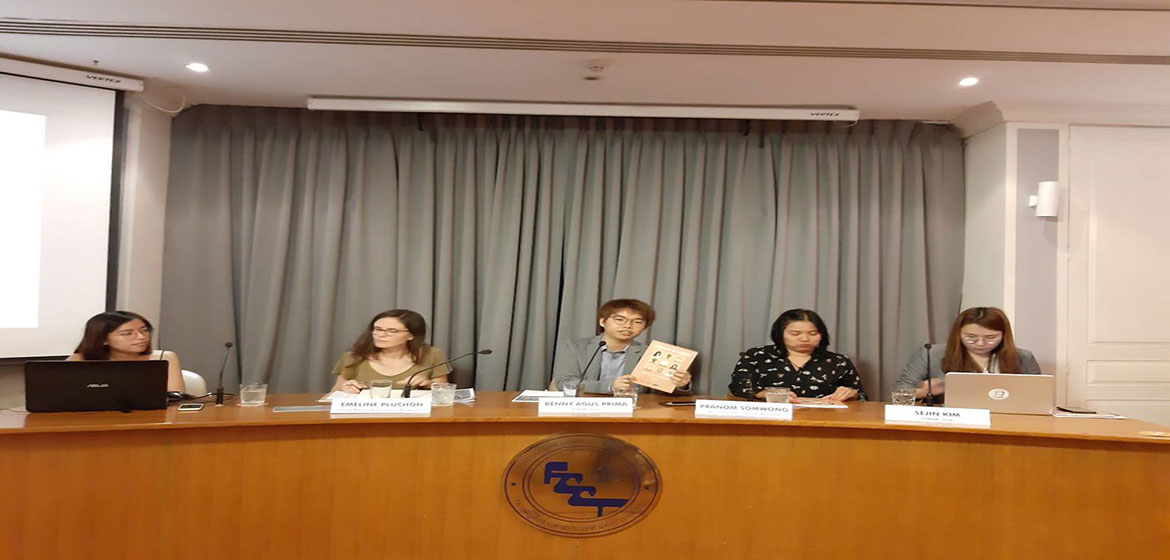(Bangkok, 31 May 2019) – ‘In Asia, we are witnessing more and more human rights defenders being subjected to increasingly severe forms of violations, particularly killings, simply for defending human rights, ’says Sejin Kim, Programme Manager of the Asian Forum for Human Rights and Development (FORUM-ASIA), during the launch of their latest report Defending In Numbers: Resistance in the Face of Repression.[1]
The report is being launched at a public event at the Foreign Correspondents’ Club of Thailand (FCCT) in Bangkok on 31 May 2019. It exposes 688 cases of human rights violations affecting 4,854 people across 18 different countries in Asia, and analyses current and emerging trends of violations against human rights defenders, including journalists, civil society organisations, advocates, and their family members, throughout 2017-2018. The findings of the report provide an important reminder of the dangerous situation human rights defenders continue to face in the region, and the much-needed work that remains to be done in order to ensure their protection.[2]
Addressing the situation of human rights defenders across Asia, the report reveals that ‘violations have become more extreme, and the safe spaces in which human rights defenders can work have increasingly shrunk.’ Throughout 2017-2018, state and non-state actors openly threatened and attacked human rights defenders, something which played a key role in creating a dangerous climate for all human rights defenders. In fact, according to the report, there were 164 cases where physical violence was used against human rights defenders. 61 of these cases resulted in the death of a human rights defender. The majority of these cases occurred in the Philippines (48 per cent) and India (25 per cent). Concerningly, most of the perpetrators of these killings remain unknown, a reality which perpetuates impunity in the region.
Another common form of violations perpetrated against human rights defenders outlined in the report is judicial harassment. In the period under review, a staggering 327 cases of judicial harassment were recorded across 17 countries.[3] Some examples involved: the (arbitrary) arrest and detention of human rights defenders; the misuse of the law and the passage of repressive laws aimed at criminalising human rights defenders; and the denial of a fair trial. Although most cases of judicial harassment were perpetrated by state actors, non-state actors, such as corporations also increasingly adopted the same strategies, as for example with the use of Strategic Lawsuit Against Public Participation (SLAAP), to harass human rights defenders. Most cases of judicial harassment occurred when human rights defenders were exercising their rights to freedom of expression or freedom of assembly, indicating the shrinking civic space in the region.
The threats and harassment endanger all human rights defenders, yet, as the report’s findings demonstrate, there are certain groups of defenders who are particularly targeted. Among them are: pro-democracy defenders, who are vocal critics of state repression; and land and environmental rights defenders, who are targeted by state and non-state actors competing to access natural resources and/or implement mega-development projects. Women human rights defenders, who challenge gender norms and power structures, also ranked high among the most affected groups. Gender-based violence, including online attacks and harassment, were common tactics used against women human rights defenders.
The report further highlights that States are marked as perpetrators in around 75 per cent of all violations recorded in Asia, demonstrating their failure to fulfil their international obligations towards human rights defenders, and even their active participation in violations.
Based on these trends and analysis, FORUM-ASIA makes several recommendations. FORUM-ASIA calls on States to improve how they fulfil their obligations under international human rights treaties and standards, particularly the United Nations (UN) Declaration on Human Rights Defenders.[1] Additionally, it calls on UN agencies, and national and transnational corporations to take action for the protection of human rights defenders in the region. As Sejin stresses, ‘It is crucial that all stakeholders play their role in protecting defenders who are bravely paving the path towards the realisation of human rights.’
The full report can be accessed at
[1] Formally known as the Declaration on the Right and Responsibility of Individuals, Groups and Organs of Society to Promote and Protect Universally Recognized Human Rights and Fundamental Freedoms. It was adopted in 1998 with the purpose of providing support and protection to all actors defending human rights through peaceful means.
[1] Defending In Numbers aims to present the patterns and trends of harassment that human rights defenders across Asia endure, based on FORUM-ASIA’s documentation. It provides an overview of the different forms of violations perpetrated against human rights defenders, the defenders affected, and the perpetrators complicit in violations. FORUM-ASIA published the first edition of Defending In Numbers, titled Defending In Numbers: Mounting Echoes of Muffled Dissent, in 2015, followed by Defending In Numbers: Silencing the Voices of Asia in 2017.
[2] The findings in this report are based on the cases documented by FORUM-ASIA and therefore can only provide a snapshot of the situation on the ground.
[3]This includes: Bangladesh, Cambodia, China, India, Indonesia, Lao PDR, Malaysia, the Maldives, Myanmar, Nepal, Pakistan, the Philippines, Singapore, South Korea, Taiwan, Thailand, Vietnam.
***
For a PDF version of the press release, click
For further information, please contact:
Communication and Media Programme, FORUM-ASIA, This email address is being protected from spambots. You need JavaScript enabled to view it.
Source:
Related to SDG 10: Reduced inequalities and SDG 16: Peace, justice and strong institutions



